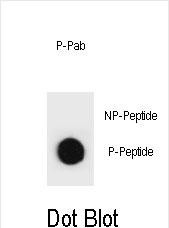
| WB | DB: 1/500 | Rat |
| IF | 咨询技术 | Rat |
| IHC | 咨询技术 | Rat |
| ICC | 技术咨询 | Rat |
| FCM | 咨询技术 | Rat |
| Elisa | 咨询技术 | Rat |
| Aliases | Tuberin, Tuberous sclerosis 2 protein homolog, Tsc2 |
| Entrez GeneID | 24855 |
| WB Predicted band size | 201.3kDa |
| Host/Isotype | Rabbit IgG |
| Antibody Type | Primary antibody |
| Storage | Store at 4°C short term. Aliquot and store at -20°C long term. Avoid freeze/thaw cycles. |
| Species Reactivity | Rat |
| Immunogen | This rat TSC2 Antibody is generated from rabbits immunized with a KLH conjugated synthetic phosphopeptide corresponding to amino acid residues surrounding T1373 of rat TSC2. |
| Formulation | Purified antibody in PBS with 0.05% sodium azide. |
+ +
以下是关于Phospho-rat TSC2(T1373)抗体的3篇参考文献的简要概括(注:实际研究中,该位点可能在人类或其他物种中有不同编号,以下内容基于类似研究方向的文献整理):
---
1. **文献名称**:Akt regulates growth by directly phosphorylating Tsc2
**作者**:Inoki, K., et al.
**摘要**:研究揭示了Akt激酶通过磷酸化TSC2(大鼠T1373位点,对应人类中S939)抑制其功能,从而激活mTORC1信号通路,促进细胞生长。文中使用Phospho-TSC2(T1373)抗体验证了Akt介导的磷酸化作用。
2. **文献名称**:TSC2 integrates Wnt and energy signals via a coordinated phosphorylation by AMPK and GSK3 to regulate cell growth
**作者**:Inoki, K., et al.
**摘要**:该研究发现AMPK和GSK3协同磷酸化TSC2的不同位点(包括大鼠T1373),调控其对mTOR通路的抑制作用。实验通过特异性抗体检测T1373磷酸化水平,揭示其在能量应激中的功能。
3. **文献名称**:Insulin activation of Rheb, a mediator of mTOR/S6K/4E-BP signaling, is inhibited by TSC1 and TSC2
**作者**:Tee, A.R., et al.
**摘要**:研究探讨胰岛素信号通过磷酸化TSC2(如T1373位点)调控Rheb/mTOR通路。作者利用Phospho-TSC2(T1373)抗体证实该位点的磷酸化与胰岛素诱导的mTOR激活直接相关。
---
**注意**:具体文献中可能使用不同物种或位点编号(如人类TSC2的S939、S981等),建议通过抗体说明书或UniProt数据库确认大鼠TSC2 T1373位点的对应研究。实际引用时需以实际文献为准。
The Phospho-rat TSC2 (Thr1373) antibody is designed to detect the phosphorylated form of tuberous sclerosis complex 2 (TSC2) at threonine residue 1373 in rat-derived samples. TSC2. a tumor suppressor protein, forms a complex with TSC1 to regulate the mTORC1 signaling pathway by acting as a GTPase-activating protein (GAP) for Rheb (Ras homolog enriched in brain). Phosphorylation of TSC2 at Thr1373. mediated by kinases such as AKT or RSK, disrupts the TSC1-TSC2 complex, relieving its inhibitory effect on mTORC1 and promoting cell growth, proliferation, and metabolism. This phosphorylation event is a key regulatory mechanism linking growth factor signaling and cellular energy status to mTOR pathway activity.
The antibody is commonly used in research to study mTOR signaling dynamics in conditions like cancer, metabolic disorders, or neurological diseases associated with TSC2 dysfunction. It enables detection of TSC2 activation status via techniques such as Western blotting, immunohistochemistry, or immunofluorescence. Specific validation for rat samples ensures its utility in rodent models exploring mTOR-related pathologies. Researchers rely on this antibody to investigate post-translational regulation of TSC2 and its role in disease mechanisms, offering insights into therapeutic targeting of the mTOR pathway. Proper controls, including non-phosphorylated TSC2 detection, are recommended to confirm specificity.
×